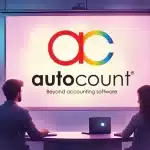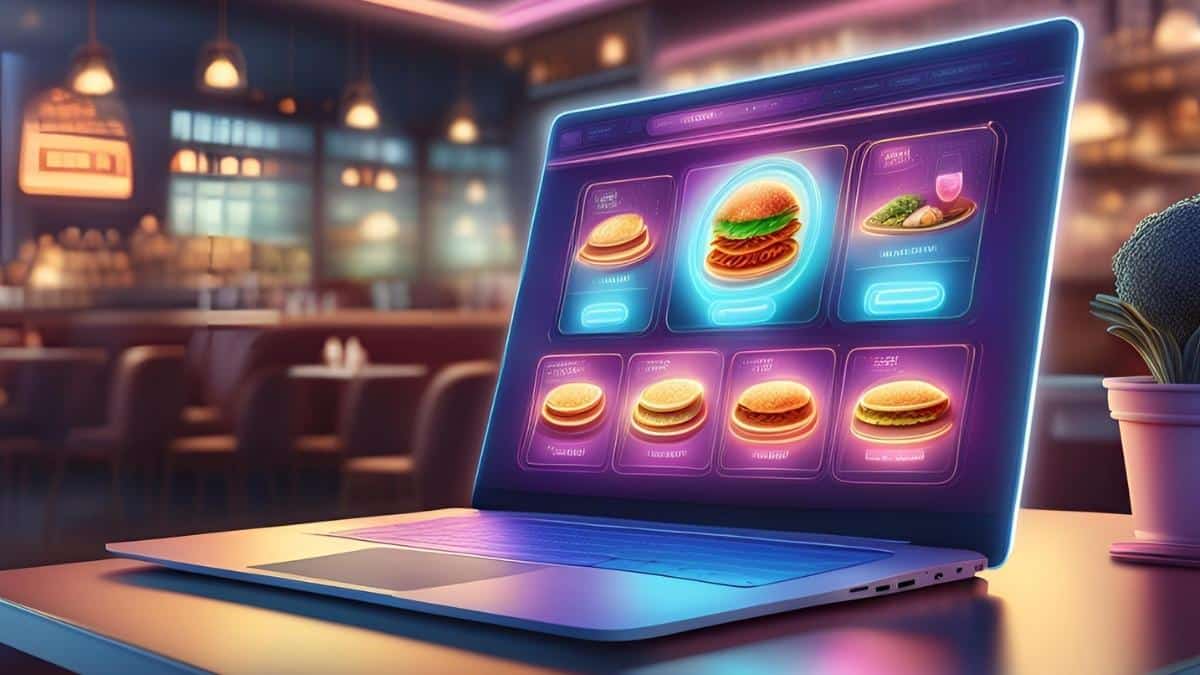Managers often face issues such as managing cash flow, tracking perishable inventory, and ensuring tax compliance. These challenges can lead to operational inefficiencies, financial discrepancies, and even regulatory penalties if not appropriately addressed.
The global restaurant management software market was valued at approximately USD 4.56 billion in 2022 and is expected to expand at a compound annual growth rate (CAGR) of 16.3% from 2023 to 2030. This growth reflects the increasing demand for software for restaurant accounting that streamlines operations and improves financial accuracy.
Join us as we explore the top 12 restaurant accounting software in Malaysia for 2026, designed to address these challenges and enhance your business’s financial health.
Key Takeaways
|
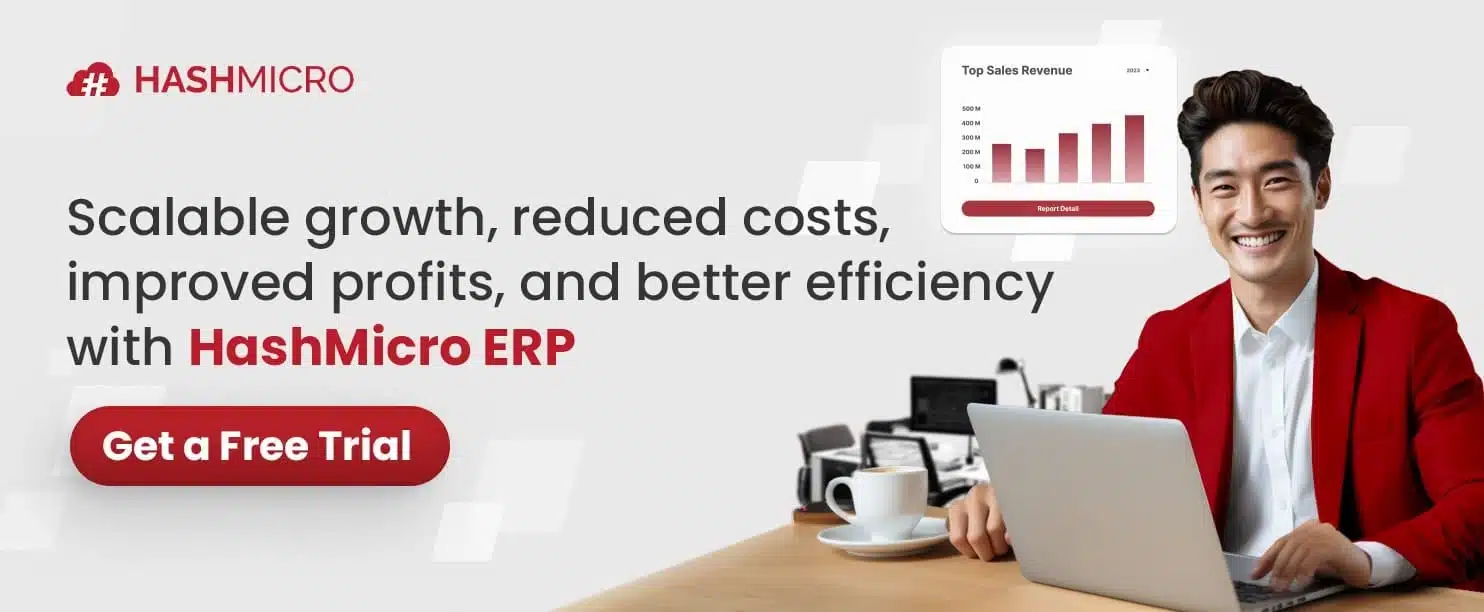
Top Restaurant Accounting Software
In my experience, finding the right accounting software can make a huge difference in how smoothly a restaurant operates. Here are some recommended restaurant accounting software programs you might want to explore.
Best because
The best end-to-end solution for all types of business needs
Best Because
A reliable tool with strong inventory and POS support
Best Because
Simple expense tracking for service-focused eateries
Best Because
Real-time tracking with great third-party integrations
Best Because
Popular choice with strong payroll and reporting features
Best Because
Free and user-friendly option for small restaurants
Best Because
POS-integrated system with advanced analytics
By using the right restaurant accounting software, you can not only save time but also gain better control over your business finances. Selecting the right solution will enable your restaurant to run more efficiently and support long-term growth.
What is Restaurant Accounting Software?
Restaurant accounting software is a tool designed to automate and simplify financial tasks for restaurants. It helps track sales, manage expenses, monitor inventory, and handle payroll, ensuring financial health and compliance with tax regulations.
As restaurants grow, this software becomes crucial for reducing errors, automating data entry, and providing real-time financial reports. This allows restaurant owners to optimize costs, improve performance, and focus on delivering great dining experiences while managing finances efficiently.
Hashy AI Fact

Need to know!
Hashy AI from HashMicro enables you to manage restaurant accounting operations through analytical reporting, automate accrual calculations, track financial states, and integrate with the purchasing system.
Request a free demo today!
Must-Have Features in Restaurant Accounting Solutions
To ensure long-term profitability and regulatory compliance, restaurant businesses need to adopt accounting software tailored to their specific needs.
Below are the must-have features in restaurant accounting solutions that empower owners to make data-driven decisions, streamline operations, and maximize revenue potential:
| Features | Why You Need it |
|---|---|
| Real-Time Inventory Tracking | Allows restaurants to automatically monitor stock levels, food usage, and ingredient costs, helping prevent overstocking and food waste while optimizing purchasing decisions. |
| POS Integration | Seamlessly connects accounting with point-of-sale systems to automatically record daily transactions, categorize sales by menu item, and provide accurate revenue insights without manual entry. |
| Cost of Goods Sold (COGS) Calculation | Automatically calculates COGS based on real-time inventory movement and purchase history, giving restaurant owners a clear understanding of profit margins. |
| Recipe and Menu Costing | Enables users to assign costs to each ingredient in a dish, allowing accurate pricing strategies and profitability analysis for every menu item. |
| Multi-Location Management | Provides centralized control over multiple branches or franchises, with consolidated financial reporting and comparative performance insights. |
Top 12 Restaurant Accounting Software in Malaysia
Choosing the right accounting software can significantly enhance a restaurant’s operational efficiency and financial accuracy. To guide your decision, we’ve compiled a clear shortlist of the leading restaurant accounting software available in the market.
- HashMicro Restaurant Accounting Software: Enterprise-ready automation for bookkeeping, inventory costing, multi-outlet reporting, and tax compliance.
- NetSuite Accounting Restaurant Software: Cloud ERP accounting for large restaurant groups needing real-time financial visibility.
- Sage 50 Accounting Software for Restaurants: Desktop accounting with strong financial controls, budgeting, and reliable reporting.
- Wave Restaurant Accounting Software: Free and beginner-friendly invoicing and basic bookkeeping for small F&B operators.
- FreshBooks Accounting Restaurant Software: Simple cloud invoicing and expense tracking for small hospitality teams.
- Xero Software for Restaurant Accounting: Automated bookkeeping, bank reconciliation, and cash flow insights with solid integrations.
- QuickBooks Accounting Restaurant Software: Popular accounting for payroll, bill payments, and detailed financial reporting.
- Lightspeed Restaurant Accounting Software: POS-driven accounting with real-time sales and financial syncing.
- SQL Accounting Software for Restaurants: Local solution with strong inventory costing and billing features.
- Bukku Software for Restaurant Accounting: Malaysian cloud accounting for small eateries needing simple billing and bookkeeping.
- Restaurant365 Accounting Restaurant Software: All-in-one restaurant suite combining accounting, inventory, and operations.
- MarginEdge Restaurant Accounting Software: Cost control, recipe costing, and invoice automation with real-time performance dashboards.
Below, you’ll find an in-depth look at the top 12 restaurant accounting software options available in Malaysia to help you assess which solution aligns best with your restaurant’s operations:
1. HashMicro Restaurant Accounting Software
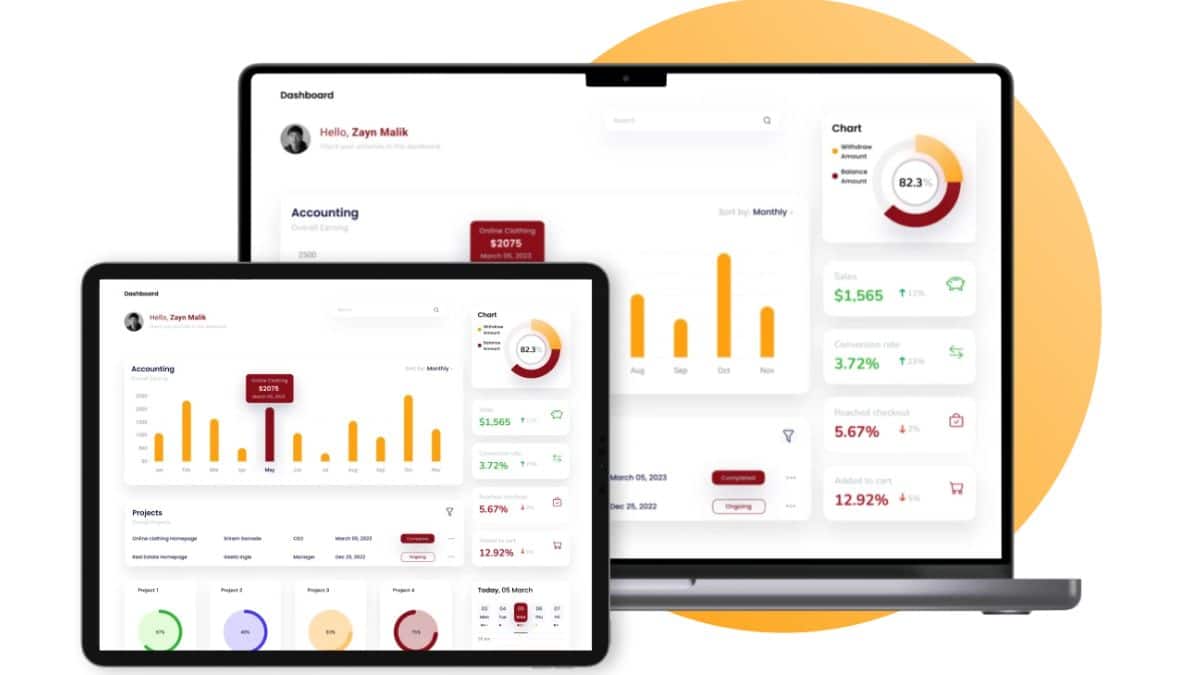
HashMicro’s Restaurant Accounting Software is a premier solution designed for Malaysian businesses looking to streamline their financial management processes. The system offers advanced tools to optimize expense tracking, revenue management, and financial reporting effectively.
With seamless integration capabilities, HashMicro’s ERP software connects effortlessly with other business applications, streamlining workflows and providing a unified perspective of restaurant operations. Malaysian restaurants can address their accounting challenges efficiently by exploring HashMicro through its free demo offering.
A key highlight of HashMicro’s solution is its adherence to ISO standards, ensuring top-tier security and service quality. Furthermore, the system offers a comprehensive approach to financial management, encompassing budgeting, cash flow monitoring, and real-time financial insights.
Here are some of the features offered by the HashMicro Accounting Solution:
- Bank Integrations – Auto Reconciliation: This feature automatically matches bank transactions with accounting records, reducing manual errors. It helps restaurants save time by streamlining the reconciliation process for daily transactions.
- Profit & Loss vs. Budget & Forecast: This tool allows restaurants to compare actual profits and losses against budgeted figures and forecasts. This helps identify financial gaps and make informed decisions to control costs.
- Cashflow Reports: Cashflow reports provide real-time insights into the inflow and outflow of cash. This helps restaurant managers monitor liquidity and ensure there’s enough cash to cover daily expenses.
- Financial Statement with Budget Comparison: This feature generates financial statements that compare actual results with budgeted targets. It enables restaurants to track financial performance and adjust strategies when needed.
- Budget & Realization: It helps restaurants manage budgets by comparing planned expenditures with actual spending. This feature is useful for controlling costs and optimizing resource allocation.
- Auto Follow-Up Customer Statement: This feature automatically sends reminders to customers about outstanding payments. Reducing delays in receiving payments improves cash flow management.
- Treasury & Forecast Cash Management: Treasury management tools help track, manage, and forecast cash needs effectively. This ensures restaurants maintain healthy cash reserves for operations and future growth.
- Chart of Accounts Hierarchy: It organizes the chart of accounts in a structured hierarchy, making it easier to manage and analyze transactions. This helps restaurant owners track specific revenue and expense categories accurately.
- Complete FS with Period Comparison: This feature generates comprehensive financial statements with period-to-period comparisons. It helps restaurants analyze financial trends and performance over time for better strategic planning.
Besides these features, HashMicro offers seamless integration capabilities with third-party systems and other modules, such as a restaurant POS system. You can easily customize the software to meet your specific business requirements, ensuring maximum operational efficiency.
| Pros | Cons |
|---|---|
|
|
“HashMicro’s restaurant accounting software doesn’t just crunch numbers—it empowers restaurateurs with precise cost control, live financial insights, and seamless integration from kitchen inventory to cash register, making profitability predictable rather than a hope.”
– Angela Tan, Regional Manager
Pricing: Contact the HashMicro team to get a tailored pricing scheme for your restaurant.
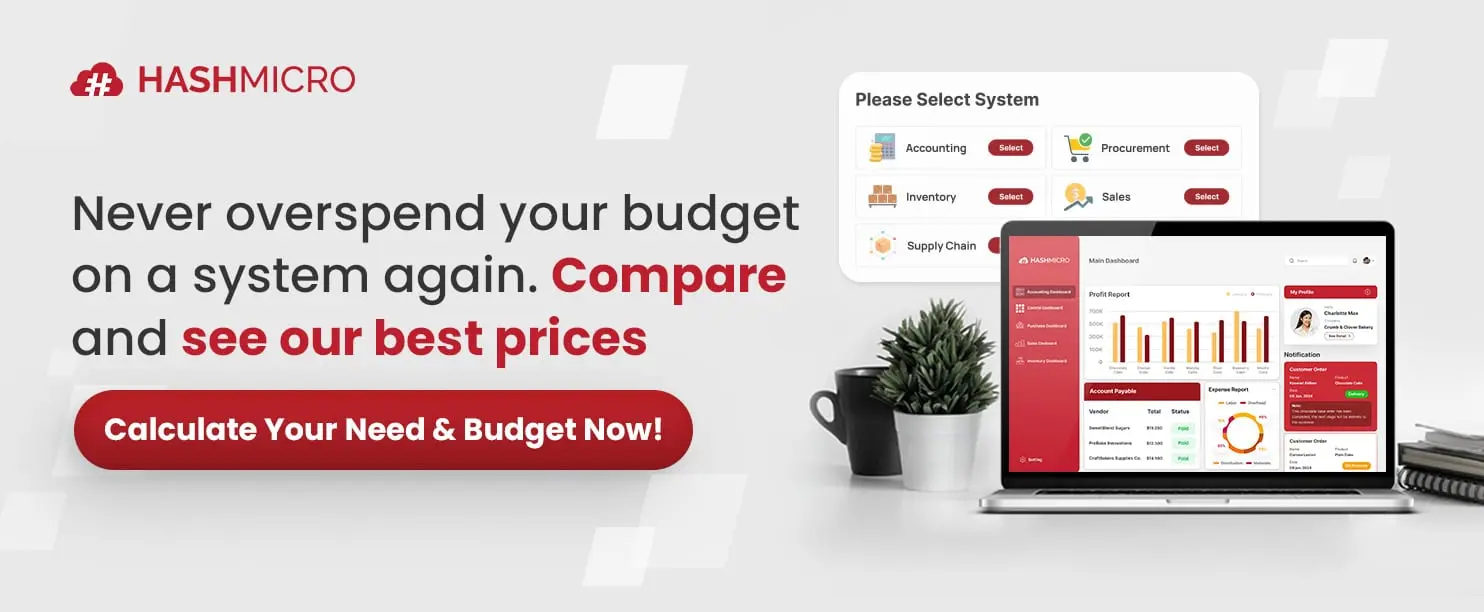
2. NetSuite accounting restaurant software

NetSuite, a global leader in cloud-based business management software, offers robust accounting solutions for restaurants. Its flexible and scalable restaurant platform is designed to meet complex financial management needs.
Key Features:
- Comprehensive financial management
- Multi-currency support
- Real-time dashboards
- Automated billing and invoicing
- Strong compliance management
| Pros | Cons |
|---|---|
|
|
Pricing: Starts from around RM410 per user/month plus about RM4,120 per month base licence (from $99 + $999).
3. Sage 50 Accounting Software for Restaurant

Sage 50 is a trusted name in software for restaurant accounting, providing reliable software tailored to retail and restaurant businesses. This restaurant accounting software offers a strong set of features that support financial management and operational efficiency.
Key Features:
- Inventory and stock management
- Invoicing and billing automation
- Cash flow monitoring
- Financial reporting tools
- Multi-user access
| Pros | Cons |
|---|---|
|
|
Pricing: Pro from about RM515/month, Premium from about RM700/month for one user (from $124.42 and $169.33).
4. Wave Restaurant Accounting Software

Wave is a popular choice for small to medium-sized retail businesses due to its intuitive interface and robust accounting features. It offers cloud-based solutions ideal for restaurant accounting needs.
Key Features:
- Income and expense tracking
- Invoicing and payment management
- Bank reconciliation
- Financial reporting dashboards
- Cloud-based accessibility
| Pros | Cons |
|---|---|
|
|
Pricing: Starts at roughly RM66/month (from $16/month).
5. FreshBooks accounting restaurant software

FreshBooks is well-known for its simple, easy-to-use accounting software designed for service-based businesses, including restaurants. It streamlines invoicing, expense tracking, and financial reporting.
Key Features:
- Automated invoicing
- Expense tracking
- Time tracking for staff
- Financial reporting tools
- Mobile accessibility
| Pros | Cons |
|---|---|
|
|
Pricing: Lite from about RM35/month, Plus from about RM63/month based on promo pricing.
6. Xero software for restaurant accounting

Xero is a cloud-based accounting software designed for businesses of all sizes, offering powerful tools for managing restaurant finances. It provides real-time financial data with strong integration capabilities.
Key Features:
- Real-time financial tracking
- Invoicing and billing automation
- Bank reconciliation
- Payroll management
- Strong third-party integrations
| Pros | Cons |
|---|---|
|
|
Pricing: Starter from around RM120/month, Standard from about RM205/month (from $29 and $50).
7. QuickBooks accounting restaurant software

QuickBooks is one of the most recognized accounting software globally, offering robust solutions for restaurant accounting. It helps manage finances, track sales, and generate comprehensive reports.
Key Features:
- Income and expense tracking
- Payroll processing
- Tax filing assistance
- Financial reporting tools
- Multi-device access
| Pros | Cons |
|---|---|
|
|
Pricing: Simple Start from about RM157/month, Essentials from about RM309/month (from $38 and $75).
8. Lightspeed restaurant accounting software

Lightspeed is a cloud-based POS and accounting solution designed for restaurants and retail businesses. It integrates POS data with accounting functions for streamlined financial management.
Key Features:
- POS and accounting integration
- Real-time sales tracking
- Inventory management
- Advanced reporting tools
- Cloud-based platform
| Pros | Cons |
|---|---|
|
|
Pricing: Starting at roughly RM285/month (from $69/month).
9. SQL Accounting Software for Restaurant

SQL Accounting Software is a Malaysia-based solution that offers robust financial management features for retail and restaurant businesses. It’s known for strong local support and compliance features.
Key Features:
- Financial accounting modules
- GST/VAT compliance
- Inventory tracking
- Payroll management
- Multi-currency support
| Pros | Cons |
|---|---|
|
|
Pricing: From RM39.50/month with available grant-based package.
10. Bukku software for restaurant accounting

Bukku is a Malaysian accounting software tailored for small to medium-sized retail and restaurant businesses. It focuses on simplicity, ease of use, and strong financial management tools.
Key Features:
- Invoicing and expense tracking
- Financial reporting tools
- Cloud-based access
- Bank reconciliation
- Multi-user support
| Pros | Cons |
|---|---|
|
|
Pricing: Seed plan from RM35/month + 8% SST, Grow plan from RM65/month.
11. Restaurant365 accounting restaurant software
 Restaurant365 is a cloud-based all-in-one platform designed specifically for restaurant operations, combining accounting, inventory & purchasing, workforce management, payroll/HR, and integration with POS systems.
Restaurant365 is a cloud-based all-in-one platform designed specifically for restaurant operations, combining accounting, inventory & purchasing, workforce management, payroll/HR, and integration with POS systems.
Key Features:
- Restaurant-Specific Accounting & GL Integration
- Inventory, Recipe & Food Cost Tracking
- Workforce Scheduling & Labor Analytics
- Vendor & Accounts Payable Automation
- Real-Time Reporting & Analytics
| Pros | Cons |
|---|---|
|
|
Pricing: Starts at about RM2,060/month (from $499/month, depending on plan).
12. MarginEdge restaurant accounting software
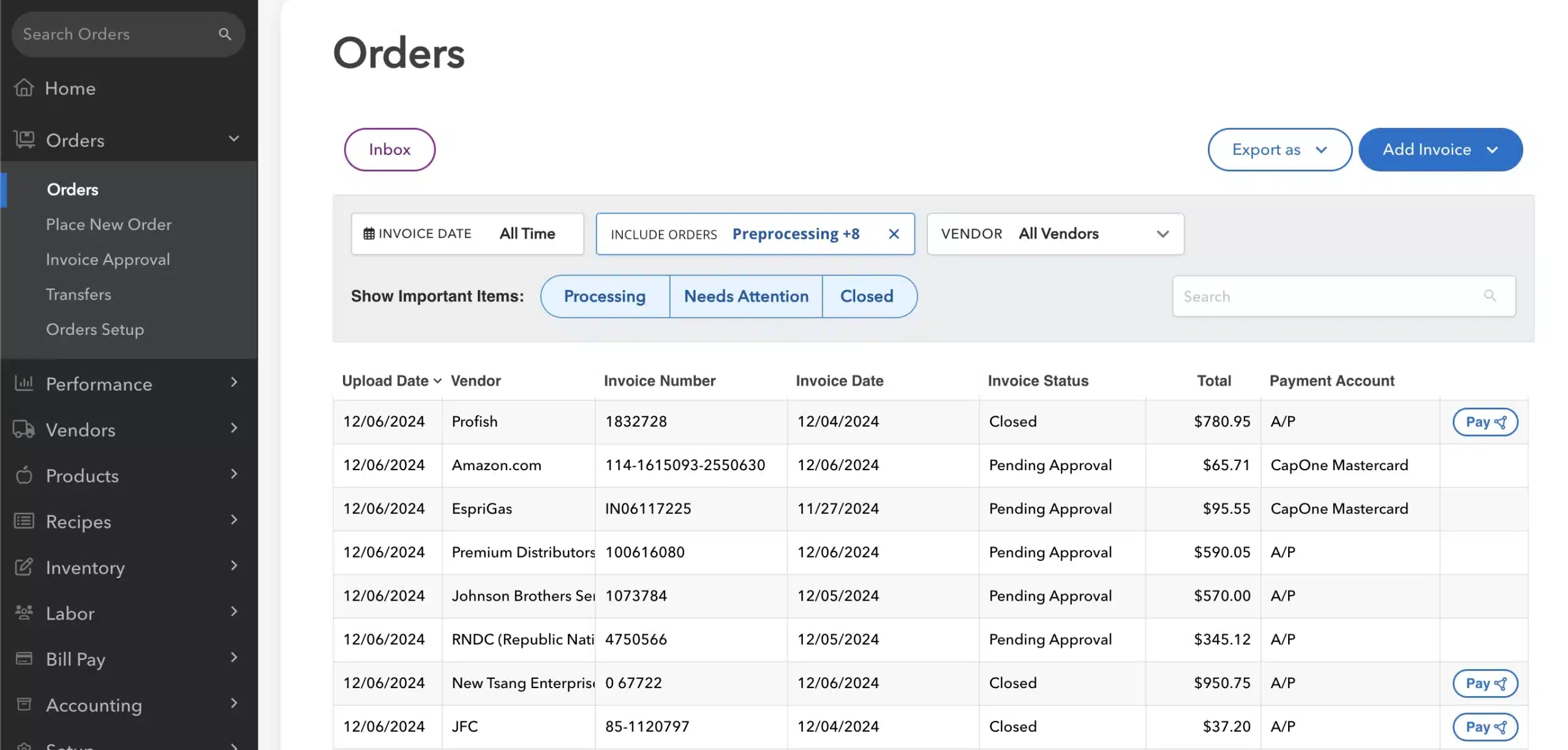 MarginEdge is a cloud-based software platform designed specifically for restaurants and food-service operators. It integrates with a variety of POS systems and accounting systems, captures invoice data and sales/labour data, tracks food/ingredient usage, and provides real-time insights into costs, profitability, and operational performance.
MarginEdge is a cloud-based software platform designed specifically for restaurants and food-service operators. It integrates with a variety of POS systems and accounting systems, captures invoice data and sales/labour data, tracks food/ingredient usage, and provides real-time insights into costs, profitability, and operational performance.
Key Features:
- Invoice & Bill Pay Automation
- Inventory, Recipe & Menu Costing
- Daily Controllable P&L & Cost-Tracking
- POS & Accounting Integrations
- Multi-Location Support & Central Control
| Pros | Cons |
|---|---|
|
|
Pricing: Around RM1,360/month (from $330/month).
Overall Comparison of Restaurant Accounting Software in Malaysia
In this overall comparison of restaurant accounting software in Malaysia, I examine the leading solutions across features, automation capabilities, pricing, and ease of use to help restaurant operators identify the platform that best aligns with their business needs.
| Provider | Connection Quality | Bank Coverage | Ease of Integration | Data Enrichment |
|---|---|---|---|---|
| HashMicro | ||||
| NetSuite | ||||
| Sage 50 | ||||
| Wave | ||||
| FreshBooks | ||||
| Xero | ||||
| QuickBooks | ||||
| Lightspeed |
Why is Restaurant Accounting Software Important?
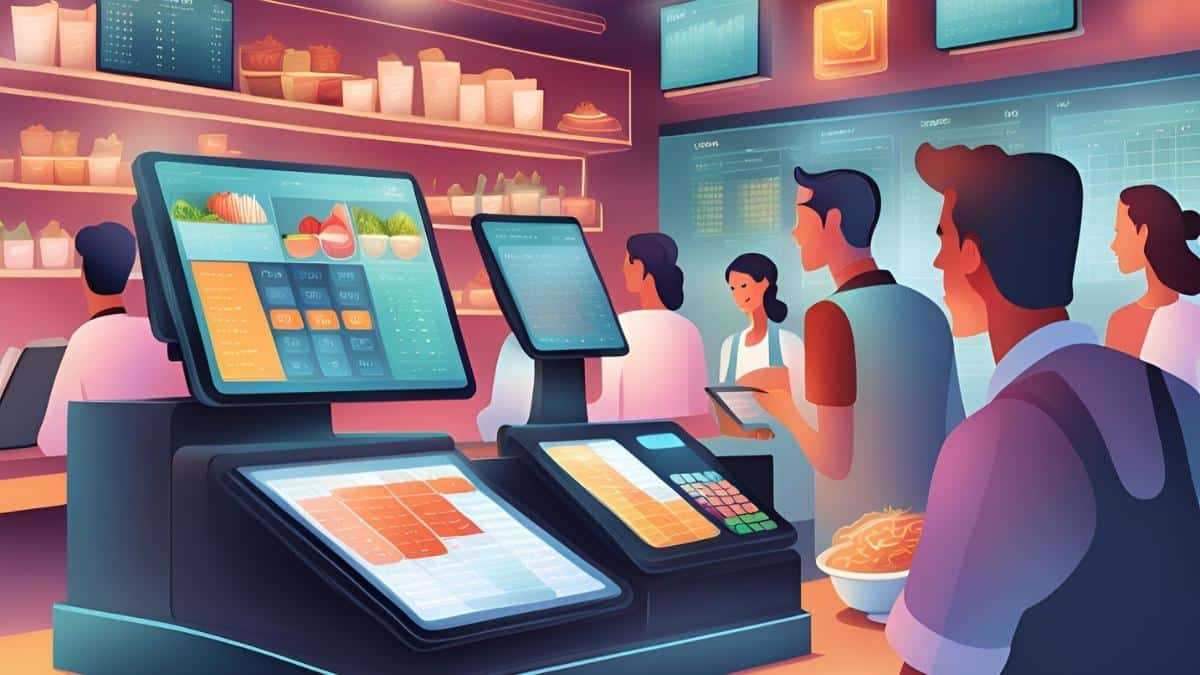
Restaurant accounting software plays a crucial role in streamlining all restaurant business operations. Below are some of the benefits of using restaurant accounting software:
- Enhances financial accuracy in sales and expenses: Restaurant accounting software minimizes errors by automating sales tracking, expense logging, and financial calculations. This ensures accurate profit margins and reliable tax audit and financial report data.
- Improves cost management through menu engineering: The software helps identify profitable menu items and reduce wastage by analyzing food costs and sales data. This enables restaurant owners to optimize pricing strategies and control ingredient expenses effectively.
- Simplifies food and beverage sales tax compliance: The software automates VAT/GST calculations, tracks taxable transactions, and generates detailed tax reports. This ensures compliance with local tax regulations and reduces the risk of penalties for late or inaccurate filings.
- Boosts operational efficiency in daily cash reconciliation: Automating cash flow tracking and reconciliation processes saves restaurant managers time. This improves accuracy in daily sales reports and minimizes discrepancies in cash handling.
- Provides real-time financial insights for profit analysis: The software offers up-to-date dashboards displaying revenue, expenses, and net profit per outlet. This allows restaurant owners to make informed decisions, adjust operations, and boost profitability.
- Supports multi-location financial consolidation: The software integrates financial data from different branches into a single platform for restaurant chains. This simplifies consolidated reporting and enables centralized control over financial performance.
- Enhances cash flow management with supplier payment tracking: The software monitors accounts payable and receivable, ensuring timely supplier payments and efficient cash flow. This helps maintain healthy vendor relationships and operational stability.
- Promotes better inventory cost control: By linking with inventory systems, the software tracks ingredient usage and cost fluctuations in real time. This reduces overstocking, prevents spoilage, and maximizes cost efficiency in inventory management.
- Facilitates payroll processing for hospitality staff: The software automates payroll calculations, tax deductions, and compliance with labor laws specific to the restaurant industry. This ensures accurate, timely salary disbursements, enhancing employee satisfaction.
- Strengthens financial planning for growth strategies: The software supports strategic expansion planning with detailed financial forecasting and budget analysis tools. This helps restaurant owners set realistic financial goals and allocate resources effectively for growth.
How to Choose the Best Accounting Software for Your Restaurant Business
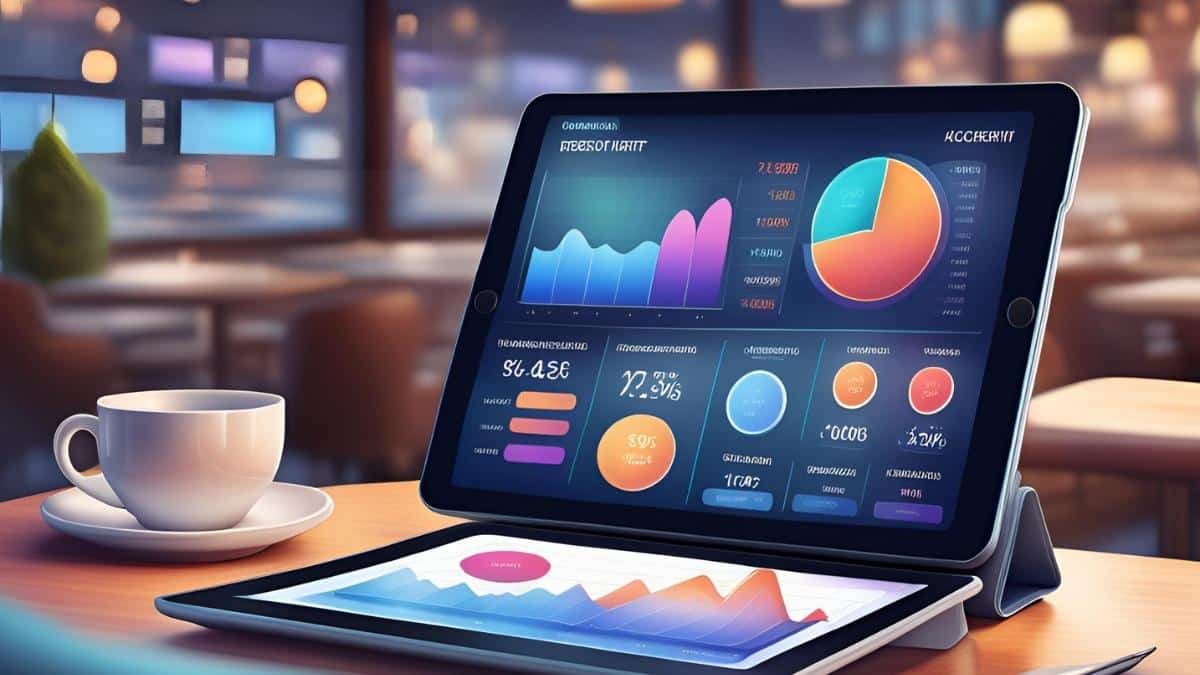
Selecting the best accounting software for your restaurant involves evaluating key factors to match your business needs. To enhance overall efficiency, consider integrating it with restaurant management software for seamless operations.
Here are essential criteria to consider:
- Identify your business needs: Understand your restaurant’s specific accounting requirements, such as payroll, inventory, or multi-location management. Knowing what you need ensures the software aligns with your operational goals.
- Consider ease of use: Choose software with an intuitive interface that your team can quickly learn and navigate. A user-friendly restaurant platform reduces training time and minimizes errors.
- Look for integration capabilities: Ensure the software integrates seamlessly with your POS, payroll, and inventory management systems. This will promote data consistency and enhance operational efficiency.
- Evaluate reporting features: Opt for software that offers robust reporting tools to provide real-time financial insights. Comprehensive reports help you make informed business decisions.
- Check for scalability: Select software that can grow with your restaurant as you expand to new locations or add services. Scalable solutions save costs on future upgrades.
- Review security features: Ensure the software has strong security measures to protect sensitive financial data. Look for features like data encryption, two-factor authentication, and regular backups.
- Assess customer support: Choose a reliable vendor to assist with technical issues or software updates. 24/7 support ensures minimal downtime during critical operations.
- Analyze cost-effectiveness: While avoiding budget discussions, consider the value the software provides in terms of features and efficiency. High-value software can improve profitability through better financial management.
Strategy for Successful Restaurant Accounting
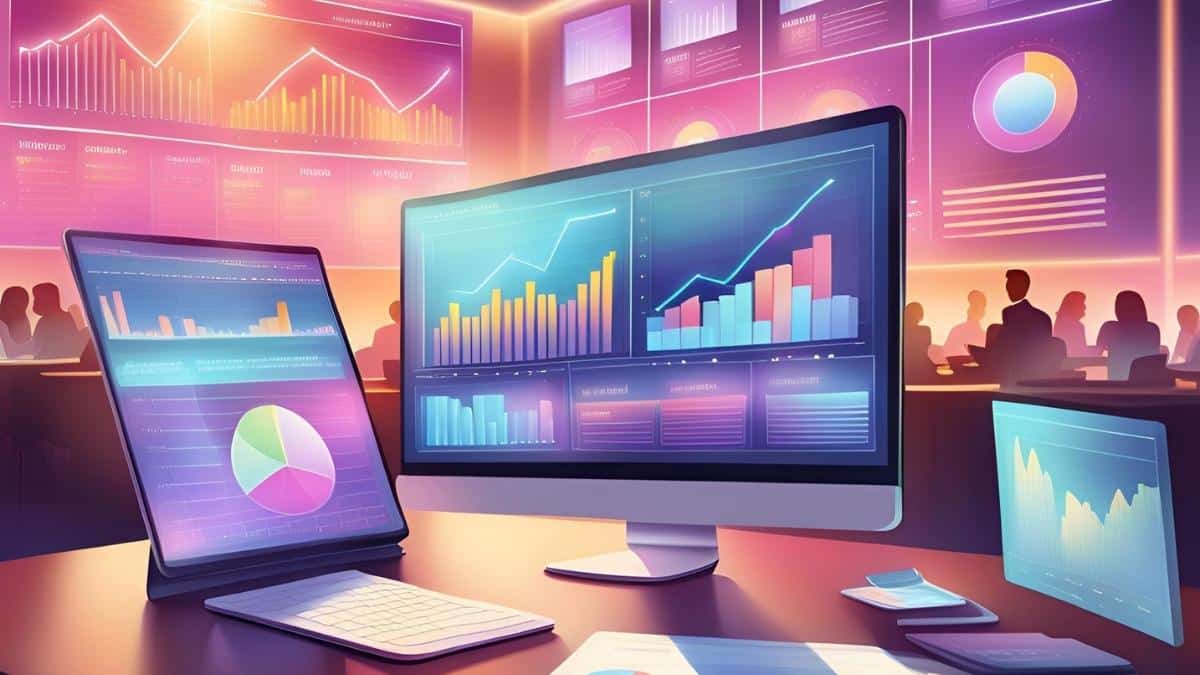
Implementing effective accounting strategies is vital for maintaining financial health and driving growth in the restaurant industry. Here are key strategies to ensure successful restaurant accounting:
- Maintain accurate financial records: Consistently update and review financial records to ensure accuracy in reporting. This helps identify discrepancies early and supports informed decision-making.
- Automate accounting processes: Leverage restaurant accounting software to automate tasks like invoicing, payroll, and tax calculations. Automation reduces errors and saves time for strategic planning.
- Implement strong cash flow management: Monitor cash flow regularly to ensure the business has sufficient liquidity. This strategy helps in managing expenses, supplier payments, and unexpected costs.
- Track inventory costs effectively: Integrate accounting software with inventory management to monitor stock levels and control food costs. This prevents overstocking, reduces waste, and maximizes profitability.
- Conduct regular financial audits: Schedule periodic audits to review financial data and ensure compliance with regulations. Audits help detect fraud, identify inefficiencies, and maintain financial integrity.
- Use real-time financial reporting: Access real-time financial reports to track performance metrics such as revenue, expenses, and profit margins. This allows quick adjustments to improve operational efficiency.
- Budget and forecast accurately: Develop detailed budgets and financial forecasts based on historical data and current trends. Accurate forecasting aids in resource allocation and long-term planning.
- Ensure tax compliance: Stay updated with local tax laws and file your taxes in a timely manner to avoid penalties. Accounting software simplifies tax management through automated calculations and reporting.
Conclusion
In Malaysia’s dynamic food and beverage industry, restaurants face increasing demands to manage their finances efficiently while maintaining profitability. With the complexities of daily transactions, fluctuating costs, and strict tax regulations, having the right accounting software is essential for streamlining financial management and ensuring long-term success.
This is where HashMicro Accounting Software makes a significant impact. Designed to enhance operational efficiency, it offers automated features for managing expenses, tracking sales, and generating real-time financial reports. Its seamless integration with other business modules allows restaurant owners to focus on growth while ensuring accurate financial oversight.
Ready to take your restaurant’s financial management to the next level? Sign up for a free demo of HashMicro Accounting Software today and discover how it can simplify your accounting processes, boost efficiency, and help your business thrive in Malaysia’s competitive restaurant scene.

FAQ About Restaurant Accounting Software
-
What is the best accounting software for a restaurant?
The best accounting software for a restaurant is HashMicro Accounting Software. It offers advanced automation features for managing expenses, tracking sales, and generating real-time financial reports.
HashMicro seamlessly integrates with POS systems and inventory management, ensuring accurate financial data, improved cash flow, and efficient tax compliance—making it the ideal solution for restaurant businesses.
-
What is the best accounting method for restaurants?
The best restaurant accounting method often depends on the business size and operational needs. The cash-based accounting method is ideal for small, independent restaurants because it simplifies bookkeeping, improves cash flow tracking, and makes tax reporting easier.
However, larger restaurants or those with complex operations may benefit from the accrual basis accounting method, which provides a more accurate picture of financial health by recording income and expenses when they are earned or incurred, not when cash changes hands.
-
What type of accounting is used in restaurants?
Restaurants typically use the cash accounting method, also known as the cash basis method, for managing their finances. This method records income when payments are received and expenses when paid, offering a clear and straightforward view of cash flow.
Given the high volume of daily cash transactions in restaurants, this approach is highly effective for maintaining accurate financial records and ensuring efficient cash management.
-
What are the three golden rules of accounting?
The three golden rules are:
1. Personal Account: Debit the receiver, credit the giver.
2. Real Account: Debit what comes in, credit what goes out.
3. Nominal Account: Debit all expenses and losses, credit all incomes and gains. -
Which software for restaurant accounting is used in Malaysia?
Many Malaysian restaurants use HashMicro Accounting Software together with HashMicro’s Restaurant POS / F&B suite to handle sales, inventory costing, and profit & loss per outlet in one integrated system, making it easier to track daily takings, food costs, and tax compliance across branches.
-
What is the 30 30 30 rule for restaurants?
The 30-30-30 rule in restaurants is a simple budgeting guideline:
1. 30% for food cost
2. 30% for labour cost
3. 30% for overheads (rent, utilities, marketing, etc.)The remaining 10% is targeted as profit.
It’s not a strict law, but a benchmark to check whether your restaurant cost structure is still healthy.









